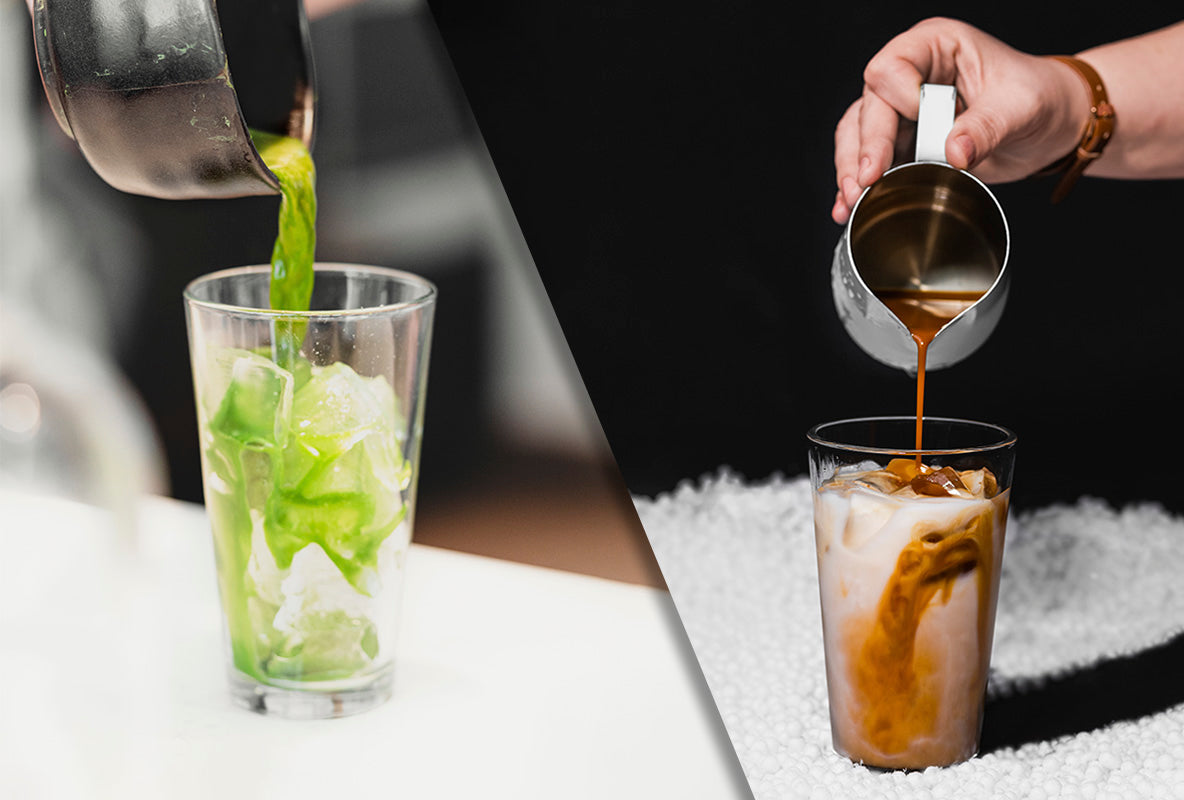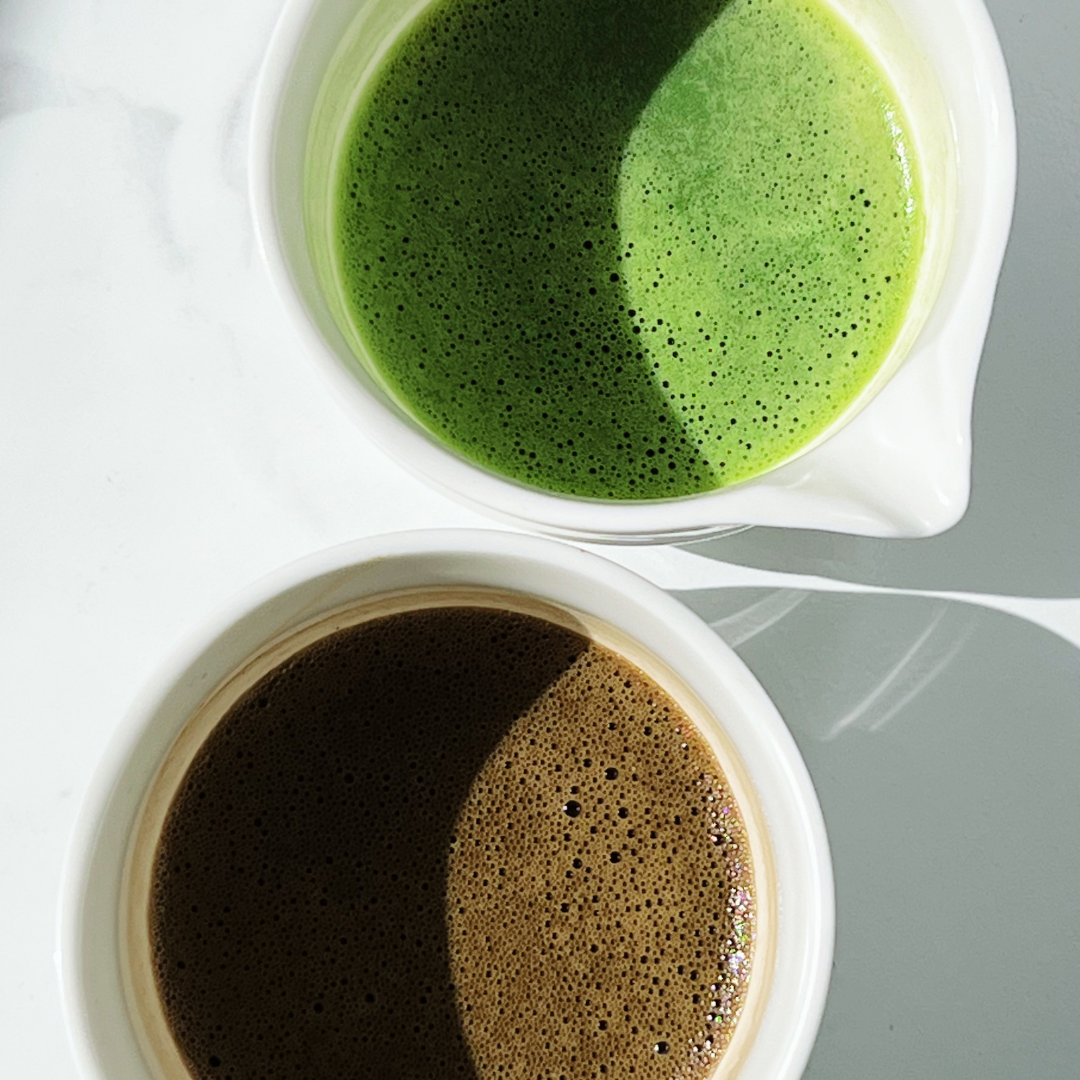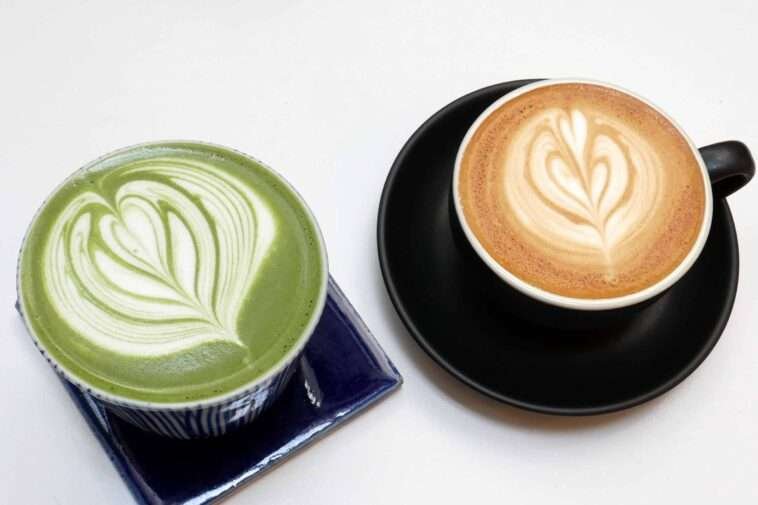Matcha vs Coffee : There is a lot of disagreement over whether matcha or coffee is superior. Some of us simply cannot fathom our mornings without the enticing aroma of freshly brewed coffee. Others have made the switch and claim that matcha has really improved their health. Learn about the advantages and disadvantages of coffee and matcha so you can make the best decision for your health.
How Do Matcha and Coffee Compare?
While coffee is already one of the most popular drinks drunk worldwide, matcha, a powdered form of Japanese green tea, is becoming more and more popular.
Over the past few years, matcha’s popularity has steadily increased. Celebrities and health experts have bragged about the benefits for the skin, vitality, and vibrancy. But how do these claimed advantages stack up against the well-established advantages of the most popular morning pick-me-up in the world?

Shared Benefits Matcha vs Coffee
Matcha and coffee are both well known for having a variety of health benefits. In actuality, the two drinks have many similar advantages.
Helps Lose Weight:
Matcha and coffee both contain caffeine, which may aid in weight loss by stimulating brown adipose tissue, or brown fat, and boosting energy expenditure and fat oxidation.Due to its capacity to produce heat and metabolise foods like glucose and fat, brown fat is thought to prevent the buildup of body fat.
In fact, according to a number of studies, some of which are older, coffee may boost your metabolic rate by up to 13% for roughly 3 hours.
Loaded with Cancer Fighting Antioxidants:
Antioxidants are advantageous substances that lessen the negative effects of oxidative stress in your body, which would otherwise promote the initiation and development of numerous diseases, including cancer.
A class of powerful antioxidants known as polyphenols can be found in fruits, vegetables, coffee, and tea. The primary elements of the polyphenols found in green tea and coffee, respectively, are EGCG and CGA. EGCG may inhibit the development of specific blood arteries that feed tumours, stop the growth and spread of tumours, as well as encourage the death of malignant cells.
Similar to this, CGA may prevent liver, colorectal, esophageal, gastric, and oral cancer by inhibiting tumour growth. In addition, coffee includes cafestol and kahweol, all of which have antioxidant properties, whereas matcha is abundant in rutin, vitamin C, and chlorophyll, giving it its distinctive green colour and full of antioxidant properties.
Protects Heart Health:
Matcha and coffee include a variety of chemicals that may help lower certain risk factors for heart disease. Its polyphenol concentration may lessen platelet aggregation, which can help keep your arteries clear and lower your risk of having a heart attack.
By preventing the absorption of fats from your gut, the EGCG present in green tea may also lower blood pressure, lower levels of total and LDL (bad) cholesterol, and lower levels of triglycerides.
Which is Better? – Macha vs Coffee
Over the past few years, matcha’s popularity has steadily increased. Celebrities and health experts have bragged about the benefits for the skin, vitality, and vibrancy. But how do these claimed advantages stack up against the well-established advantages of the most popular morning pick-me-up in the world?

Benefits of Macha
A number of studies have recently focused on Japanese green tea powder. Its potential for improving health has been discovered through research. Compare the advantages of matcha with coffee.
Doesn’t Give a Caffeine Crash
If matcha is stronger than coffee, you might be curious. Matcha has less caffeine than coffee, despite the fact that both beverages contain caffeine. Matcha’s plant phytonutrients reduce the caffeine’s release, giving the feeling of longer-lasting energy. L-theanine, another amino acid found in matcha, may help with alertness, reduce weariness, and provide a longer-lasting sense of energy when paired with caffeine.
More Antioxidants
Matcha’s antioxidant abilities have been thoroughly researched. It has a high level of antioxidants, including catechins, which are plant components that naturally serve as antioxidants. These substances may improve cellular defence and lower the risk of developing specific chronic diseases. Your ability to absorb antioxidants may increase if you include matcha in your diet, which may benefit your heart and brain.
May Improve Oral Health
Matcha’s high concentration of accessible plant components may aid to lessen oral health problems including gingivitis and bad breath. The chemical that causes bad breath, methyl mercaptan, is produced less frequently when matcha is consumed. Matcha is also rich in EGCG, an antioxidant that protects against the germs that cause tooth decay and cavities.
Cons of Matcha
More Expensive
Sadly, matcha may be quite expensive. It costs considerably more than coffee. Depending on the type and quality, a 12-ounce bag of organic ordinary coffee could cost between $10 and $15, while the same amount of matcha could cost upwards of $100. It is important to remember that you use far less matcha than coffee. While a 12-ounce bag of coffee would only yield 12–15 cups, a 12-ounce portion of matcha would likely yield 150–200 servings.
Might Increase Liver Toxicity
The likelihood of liver harm from matcha green tea is quite minimal when used sensibly. While the catechins in matcha are typically healthy, too much might cause hepatotoxicity, a disease where the liver becomes overworked. When a person consumes an excess of herbs or supplements, this syndrome develops.
Benefits of Coffee
Millions of people throughout the world enjoy coffee. Many people find it difficult to begin the day without their morning coffee because it is known for its capacity to increase energy and focus. But there are other benefits to coffee besides its energising power. The traditional beverage may aid in good weight management and has been linked to lower incidence of depression.
Less Expensive
Clearly, coffee is less expensive than tea. The price is reduced since it is produced in greater numbers and is cultivated in more locations worldwide. Additionally, you can purchase many coffee varieties for even less money. Two strategies to save money are to buy instant coffee or grind your own coffee beans.
More Easily Accessible
Coffee is significantly easier to get because it is so widely consumed. Even extremely small villages will typically have a coffee shop or stand. No matter where you are, you can find coffee in one form or another because supermarkets and shops frequently sell a wide variety of coffee brands and sorts. With matcha, which isn’t widely available, this is not the case.
Can Help Weight Management?
The scientific evidence is insufficient to say that coffee always aids in weight management. An extremely brief assessment of 12 research found that increasing daily coffee consumption was associated with decreased body fat percentages, particularly in men. Although these findings seem encouraging, more studies are required before we can definitively correlate coffee drinking with weight loss.
Cons of Coffee
More Side Effects
The drawbacks of coffee could be as follows:
Adrenaline: High caffeine intake activates your fight-or-flight response by causing the body to produce adrenaline. Regularly consuming large amounts of coffee puts you at risk for anxiety, palpitations, and excessive perspiration.
Insomnia: It has been demonstrated that consuming more caffeine has an impact on how quickly one falls asleep.
Dependence: Despite the fact that the chemicals in coffee are not specifically addictive, large dosages may cause psychological or physical dependence in users.
Coffee can Lead to Caffeine Crash
Once the stimulation of the caffeine wears off, you could experience a variety of symptoms associated with the caffeine crash, such as:
Extreme tiredness
Inability to concentrate
Irritability
Headaches
Read More: Beat The Heat with 5 Fruit Lollies You Can Make at Home
The Bottom-line of Matcha vs Coffee
You can get an energy boost from either beverage, but they both work in different ways.
Coffee is well known for providing users with an instant energy boost that reduces fatigue and lethargy. This is because your body absorbs up to 99% of the caffeine you consume, reaching its peak blood concentration as rapidly as 15 minutes after consumption. Caffeine can help you stay awake by blocking the receptors for adenosine, a substance with sleep-inducing qualities, once it has entered your brain.
Matcha also has caffeine in it. However, compared to coffee, this beverage might provide you an energy boost more gradually. They both contain a tonne of antioxidants and even have some similar health advantages. For instance, they may both encourage weight loss and boost energy levels while reducing your risk of cancer and heart disease.





